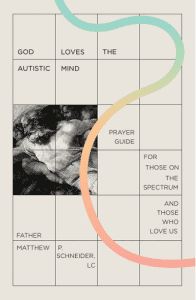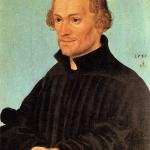The full title of this book is God Loves the Autistic Mind: Prayer Guide for Those on the Spectrum and Those Who Love Us (Boston, Pauline Books & Media, 10 June 2022). See the publisher’s book page and Amazon page for more information and purchase.
In a press release for this book, it was noted that “more than 3.5 million people in the United States live with autism.” One of them is my oldest son, Paul (now 31): a very special, talented, and orthodox Catholic young man who has immeasurably blessed our family and his many friends, and 649 current subscribers to his YouTube channel: The Catholic Gaming Nerd. Thus, I have a special interest in this book, which is an accessible, down-to-earth volume and top-notch resource.
Fr. Schneider writes from personal experience. He was diagnosed with autism after he became a priest, and has utilized the opportunities and resources of his priesthood and the Internet (and now a book) to reach out to and educate and encourage many with regard to autism.
One of the results of those endeavors is this marvelous book, which is an encouraging resource for autistics, who often feel lonely, alienated, and frustrated in living among those of us whom they charmingly term “neurotypicals.” It’s also a font of useful information for everyone, to better understand and appreciate our autistic brothers and sisters, who are not “abnormal”; just different.
As the subtitle indicates, it’s first and foremost a prayer guide for autistics (said to be the first of its kind). But Fr. Schneider also explains throughout the book what it’s like to be autistic in a non-autistic world: more often than not drawing from his own experience. Everyone can learn and benefit from his insights. I certainly have. I give it my very highest recommendation.
I’d like to now cite several excerpts, in order to provide readers with the “flavor” of the book. Appendix A (“What is Autism?”) is very helpful. Fr. Schneider explains that autistic persons experience ongoing difficulties in social interaction, including:
not reading social cues, difficulties in eye contact, awkwardness in reciprocal communication, difficulty maintaining relationships, or difficulty in speaking. (p. 192)
He mentions several times that not all autistics will have every trait. But most have many of them, allowing experts to make generalizations. Another widespread characteristic of autistics is repetitive and focused patterns, interests, and activities. He elaborates:
This criterion includes repetitive motor movements (stimming or flapping), insistence on sameness, very obsessive or limited interests, hypersensitivity or hyposensitivity . . . (p. 192)
Fr. Schneider then describes several other common traits:
Autistics have different sensory processing. . . . An autistic person who is over-stimulated will have a strong reaction such as a shutdown or meltdown. A meltdown may seem like a tantrum to some outside, but it is a non-voluntary response to being overwhelmed, . . . [later, on page 208, he compares these meltdowns to the overheating of a car]
Autistics think differently. . . .
Autistics move differently. . . .
Autistics communicate differently. . . .
Autistics socialize differently. (pp. 193-194)
On page 29, Fr. Schneider made a point about autistics that I was unaware of:
We tend to move from a bunch of specific points to a general principle rather than vice-versa, . . . If I want to imagine the scene or contemplate the Lord’s words, I want to know all the details.
On a related note, he states:
We need to help autistic young people with rational explanations of the faith or seek these out if we are autistics learning the faith. In this, it is important to use a lot of inductive reasoning, not just deductive. (p. 35)
I personally resonate with this, as a professional Catholic apologist, whose task is to rationally explain and defend the Catholic faith and larger Christianity. I’m delighted to hear that it seems that autistic persons would particularly benefit from apologetics. Fr. Schneider added:
If we understand the logical reasons for God’s existence and then logical reasons to worship him on Sunday, we can easily be steadfast. We just need to learn this logically. (p. 39)
In the first paragraph of his Introduction, Fr. Schneider, citing academic studies, explains another important — and troubling — fact about autistics and religion that I hadn’t heard before:
We feel more like an outsider in social groups, including in church. In fact, we are nearly twice as likely as anyone else (1.84 times) to never attend church, and not attending church is more likely for us than for persons with any other condition. Also, autistics are significantly more likely to be atheists and agnostics, or to make their own religious system. (p. 1)
On page 19, he wrote, similarly: “For many of us, Sunday Mass is going to be one of the more difficult things we do every week regarding social interaction and sensory issues.”
The heart of the book is the 52 meditations that take up 121 pages out of 211 total. Fr. Schneider explains on page 68 that each one consists of a story (often from his own life), a Bible passage, a reflection, and a short prayer. I would like to conclude my review by offering brief excerpts of two of these.
13. In God’s Eyes, Being Autistic Is Not Wrong
Story
My drive home from the psychologist after receiving an autism diagnosis was tough. . . . It seemed like a sentence to constantly be a failure as a priest. . . .
It took me a few months to come to terms with being autistic, but I think I did. I realize now that this is a gift God gave me. Sure, at times it is a cross, but every person has his crosses: I now know clearly what my own cross is.
Passage
For you formed my inward parts,
you knitted me together in my mother’s womb.
I praise you, for I am wondrously made.
Wonderful are your works!
You know me right well (Ps 139:13-14).Reflection
. . . Christianity is unique in recognizing how wonderful people are and what dignity they have no matter what their mental or physical condition. . . .
We might think that autism is only negative or only suffering, but we can often enjoy certain things more, and find happiness in things that others might not. . . . God wants our happiness as autistic people, even if that happiness is not the same as others’ happiness.
Prayer
Lord, who made me in your image and likeness, who formed me in my mother’s womb to be autistic, help me to accept this and find happiness in this. (pp. 95-97)
52. Missionaries to the Autistic World
Story
. . . Being autistic, I have a perspective from which, without even much effort, I can think of things that elude neurotypicals due to their different cognitive structures. . . .
I might also explain [i.e., to parents of autistic children] that there is no sin in stepping out of Mass for two minutes if a sensory break is needed, and that stim toys or weighted blankets are perfectly fine to use in prayer or even Mass. These seem so obvious to me, yet parents trying to help their autistic children for years never thought of them. This shows a certain role we autistics have in evangelizing our fellow autistics.
Passage
As many of you as were baptized into Christ have put on Christ. There is neither Jew nor Greek, there is neither slave nor free, there is neither male nor female; for you are all one in Christ Jesus (Gal 3:27-28).
Reflection
. . . As autism is a different brain structure, it is always going to be a different culture, and in many ways the difference is deeper and more dramatic than most cultural differences. . . .
The evangelization of any culture starts from outside, but to be full and effective, it must involve the full understanding of those inside the culture. . . .
If we each take our mission seriously, we will help change the narrative of the stereotypical autistic being an atheist. Autistics tend to either be atheists or serious about a religion. We don’t get the social pressure to be semi-religious that happens to those who go to church a few times a year and kind of believe. We either believe or we don’t. Those finishing this book can hopefully help some autistics move from non-belief to belief.
Prayer
Jesus, you want to speak to me and my fellow autistics in a way proper for us to understand. Help me share with my fellow autistics this joy of knowing you. (pp. 187-189)
Surely, these wise reflections from Fr. Schneider will challenge those of us in the Catholic and larger Christian community, to make all efforts to make autistics feel more comfortable in church and in Christian environments and ways of thinking and believing. We owe this to them, in Christian charity, and we need to apply the practical and loving approach of St. Paul in his own life. He had “become all things to all men, that he might by all means save some” (1 Cor 9:22, RSV).
Autistics will greatly benefit from reading this book insofar as they will be encouraged with regard to God’s acceptance and love towards them, and learn autistic-oriented ways to pray and worship that can only give them aid and solace in their lives of Christian discipleship.
***
Photo credit: image from the Pauline Books & Media page for this volume.
***
Summary: Fr. Matthew P. Schneider’s book, God Loves the Autistic Mind, offers a very helpful guide for autistics in prayer, & much-needed assistance to us “neurotypicals.”














